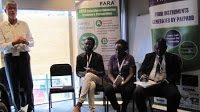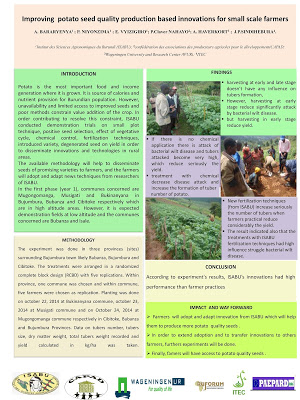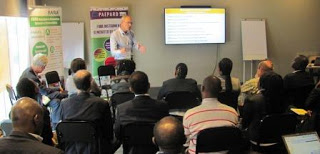 14-16 October 2016. Several pre-conference events were held @ the RUFORUM Biennial
14-16 October 2016. Several pre-conference events were held @ the RUFORUM Biennial 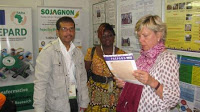
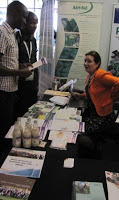 Training workshop Processes and Practices in multi-stakeholder partnerships in ARD:
Training workshop Processes and Practices in multi-stakeholder partnerships in ARD:
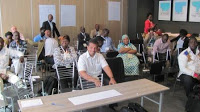
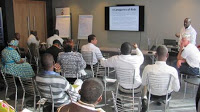 Workshop on monitoring and evaluation
Workshop on monitoring and evaluation
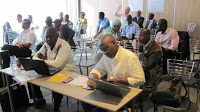 The first M&E visit to all the projects was at the beginning of 2015, when the FARA M and E Specialist assisted the teams revise their Results Frameworks (RFs) and establish the baseline values and indicator targets for ease tracking implementation progress. Assessment is made from quarterly technical and financial reports and the once-in-a-year Monitoring visit.
The first M&E visit to all the projects was at the beginning of 2015, when the FARA M and E Specialist assisted the teams revise their Results Frameworks (RFs) and establish the baseline values and indicator targets for ease tracking implementation progress. Assessment is made from quarterly technical and financial reports and the once-in-a-year Monitoring visit. 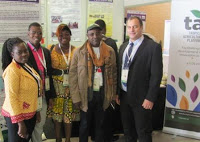 Objectives
Objectives
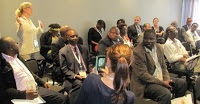 All the 4 projects have generated (or are likely to generate) impressive outputs. The projects working
All the 4 projects have generated (or are likely to generate) impressive outputs. The projects working 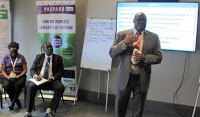 with a diverse array of value chain actors have generated high expectations that may neither be satisfied in the current phase, nor achieve a scale that can achieve meaningful impact within the 3-year implementation period within which to generate research technologies and scale them out to end users. Nonetheless,
with a diverse array of value chain actors have generated high expectations that may neither be satisfied in the current phase, nor achieve a scale that can achieve meaningful impact within the 3-year implementation period within which to generate research technologies and scale them out to end users. Nonetheless,
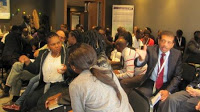
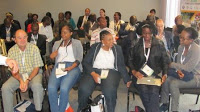 See further: PAEPARD-CRF_Monitoring and Evaluation visit Report (Jonas Mugabe and Clesensio
See further: PAEPARD-CRF_Monitoring and Evaluation visit Report (Jonas Mugabe and Clesensio 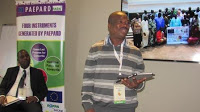 Workshop on the improvement of the use of the Open Source OSIRIS: all deliverables and consortia agendas have an electronic format and the PAEPARD supported consortia are able to promote their activities on the Web and publish documents or information related to their results.
Workshop on the improvement of the use of the Open Source OSIRIS: all deliverables and consortia agendas have an electronic format and the PAEPARD supported consortia are able to promote their activities on the Web and publish documents or information related to their results.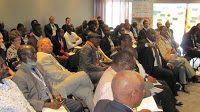 Retrospective and prospective of PAEPARD write-shops under the capacity building strategy of PAEPARD
Retrospective and prospective of PAEPARD write-shops under the capacity building strategy of PAEPARD
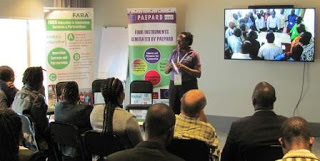 Over the past five years, some 55 concept notes and proposals have been submitted by the consortia
Over the past five years, some 55 concept notes and proposals have been submitted by the consortia
supported by PAEPARD. Finally, 11 submitted proposals have been selected for a call organized by a diversity of donors.
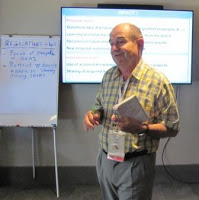 A lot of energy is put into the writing and submission of proposals. However, only a few proposals are finally selected for funding. But particularly, for the proposals submitted under the Applied Research Fund (ARF) of the Dutch
A lot of energy is put into the writing and submission of proposals. However, only a few proposals are finally selected for funding. But particularly, for the proposals submitted under the Applied Research Fund (ARF) of the Dutch 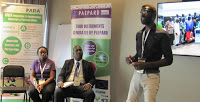 See further: Lessons learnt from the write-shops (capacity building) (October 2016, 19 pages) Extracts from the Stepman, F. (Ed.) PAEPARD 2016. Brokerage in ARD: from assumptions to reality
See further: Lessons learnt from the write-shops (capacity building) (October 2016, 19 pages) Extracts from the Stepman, F. (Ed.) PAEPARD 2016. Brokerage in ARD: from assumptions to reality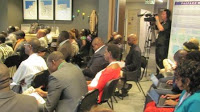 During the two calls launched by PAEPARD in 2010 and 2011 many African universities joined other
During the two calls launched by PAEPARD in 2010 and 2011 many African universities joined other 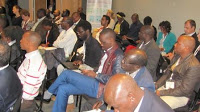 Here are four examples of African universities playing an active role in PAEPARD supported
Here are four examples of African universities playing an active role in PAEPARD supported 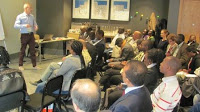
that in 2011 submitted a concept on Angular Leaf Spot disease of citrus. In 2014, the strategic innovation platform got a support from the Sub-Saharan Challenge Program (SSA CP) to build the capacity of stakeholders in working together. The disease is about to be controlled with the use of the concept of the Innovation Platform (IP) in scaling out the technology developed by scientists of the university of Ghana and other stakeholders including producers. Also the IP has attracted other partners such as
GIZ who are dealing with marketing of citrus and the Fruit Fly project funded by the World Bank via CORAF.
Source: PAEPARD FEED
by secretary
by secretary
by secretary
by secretary
by secretary
by secretary
by secretary
by secretary
by secretary
by secretary
by secretary
by secretary
by secretary
by secretary
by secretary
by secretary
by secretary
by secretary
by secretary
by secretary
by secretary
by secretary
by secretary
by secretary
by secretary
by secretary
by secretary
by secretary
by secretary
by secretary
by secretary
by secretary
by secretary
by secretary
by secretary
by secretary
by secretary
by secretary
by secretary
by secretary
by secretary
by secretary
by secretary
by secretary
by secretary
by secretary
by secretary
by secretary
by secretary
by secretary
by secretary
by secretary
by secretary
by secretary
by secretary
by secretary
by secretary
by secretary
by secretary
by secretary
by secretary
by secretary
by secretary
by secretary
by secretary
by secretary
by secretary
by secretary
by secretary
by secretary
by secretary
by secretary
by secretary
by secretary
by secretary
by secretary
by secretary
by secretary
by secretary
by secretary
by secretary
by secretary
by secretary
by secretary
by secretary
by secretary
by secretary
by secretary
by secretary
by secretary
by secretary
by secretary
by secretary
by secretary
by secretary
by secretary
by secretary
by secretary
by secretary
by secretary
by secretary
by secretary
by secretary
by secretary
by secretary
by secretary
by secretary
by secretary
by secretary
by secretary
by secretary
by secretary
by secretary
by secretary
by secretary
by secretary
by secretary
by secretary
by secretary
by secretary
by secretary
by secretary
by secretary
by secretary
by secretary
by secretary
by secretary
by secretary
by secretary
by secretary
by secretary
by secretary
by secretary
by secretary
by secretary
by secretary
by secretary
by secretary
by secretary
by secretary
by secretary
by secretary
by secretary
by secretary
by secretary
by secretary
by secretary
by secretary
by secretary
by secretary
by secretary
by secretary
by secretary
by secretary
by secretary
by secretary
by secretary
by secretary
by secretary
by secretary
by secretary
by secretary
by secretary
by secretary
by secretary
by secretary
by secretary
by secretary
by secretary
by secretary
by secretary
by secretary
by secretary
by secretary
by secretary
by secretary
by secretary
by secretary
by secretary
by secretary
by secretary
by secretary
by secretary
by secretary
by secretary
by secretary
by secretary
by secretary
by secretary
by secretary
by secretary
by secretary
by secretary
by secretary
by secretary
by secretary
by secretary
by secretary
by secretary
by secretary
by secretary
by secretary
by secretary
by secretary
by secretary
by secretary
by secretary
by secretary
by secretary
by secretary
by secretary
by secretary
by secretary
by secretary
by secretary
by secretary
by secretary
by secretary
by secretary
by secretary
by secretary
by secretary
by secretary
by secretary
by secretary
by secretary
by secretary
by secretary
by secretary
by secretary
by secretary
by secretary
by secretary
by secretary
by secretary
by secretary
by secretary
by secretary
by secretary
by secretary
by secretary
by secretary
by secretary
by secretary
by secretary
by secretary
by secretary
by secretary
by secretary
by secretary
by secretary
by secretary
by secretary
by secretary
by secretary
by secretary
by secretary
by secretary
by secretary
by secretary
by secretary
by secretary
by secretary
by secretary
by secretary
by secretary
by secretary
by secretary
by secretary
by secretary
by secretary
by secretary
by secretary
by secretary
by secretary
by secretary
by secretary
by secretary
by secretary
by secretary
by secretary
by secretary
by secretary
by secretary
by secretary
by secretary
by secretary
by secretary
by secretary
by secretary
by secretary
by secretary
by secretary
by secretary
by secretary
by secretary
by secretary
by secretary
by secretary
by secretary
by secretary
by secretary
by secretary
by secretary
by secretary
by secretary
by secretary
by secretary
by secretary
by secretary
by secretary
by secretary
by secretary
by secretary
by secretary
by secretary
by secretary
by secretary
by secretary
by secretary
by secretary
by secretary
by secretary
by secretary
by secretary
by secretary
by secretary
by secretary
by secretary
by secretary
by secretary
by secretary
by secretary
by secretary
by secretary
by secretary
by secretary
by secretary
by secretary
by secretary
by secretary
by secretary
by secretary
by secretary
by secretary
by secretary
by secretary
by secretary
by secretary
by secretary
by secretary
by secretary
by secretary
by secretary
by secretary
by secretary
by secretary
by secretary
by secretary
by secretary
by secretary
by secretary
by secretary
by secretary
by secretary
by secretary
by secretary
by secretary
by secretary
by secretary
by secretary
by secretary
by secretary
by secretary
by secretary
by secretary
by secretary
by secretary
by secretary
by secretary
by secretary
by secretary
by secretary
by secretary
by secretary
by secretary
by secretary
by secretary
by secretary
by secretary
by secretary
by secretary
by secretary
by secretary
by secretary
by secretary
by secretary
by secretary
by secretary
by secretary
by secretary
by secretary
by secretary
by secretary
by secretary
by secretary
by secretary
by secretary
by secretary
by secretary
by secretary
by secretary
by secretary
by secretary
by secretary
by secretary
by secretary
by secretary
by secretary
by secretary
by secretary
by secretary
by secretary
by secretary
by secretary
by secretary
by secretary
by secretary
by secretary
by secretary
by secretary
by secretary
by secretary
by secretary
by secretary
by secretary
by secretary
by secretary
by secretary
by secretary
by secretary
by secretary
by secretary
by secretary
by secretary
by secretary
by secretary
by secretary
by secretary
by secretary
by secretary
by secretary
by secretary
by secretary
by secretary
by secretary
by secretary
by secretary
by secretary
by secretary
by secretary
by secretary
by secretary
by secretary
by secretary
by secretary
by secretary
by secretary
by secretary
by secretary
by secretary
by secretary
by secretary
by secretary
by secretary
by secretary
by secretary
by secretary
by secretary
by secretary
by secretary
by secretary
by secretary
by secretary
by secretary
by secretary
by secretary
by secretary
by secretary
by secretary
by secretary
by secretary
by secretary
by secretary
by secretary
by secretary
by secretary
by secretary
by secretary
by secretary
by secretary
by secretary
by secretary
by secretary
by secretary
by secretary
by secretary
by secretary
by secretary
by secretary
by secretary
by secretary
by secretary
by secretary
by secretary
by secretary
by secretary
by secretary
by secretary
by secretary
by secretary
by secretary
by secretary
by secretary
by secretary
by secretary
by secretary
by secretary
by secretary
by secretary
by secretary
by secretary
by secretary
by secretary
by secretary
by secretary
by secretary
by secretary
by secretary
by secretary
by secretary
by secretary
by secretary
by secretary
by secretary
by secretary
by secretary
by secretary
by secretary
by secretary
by secretary
by secretary
by secretary
by secretary
by secretary
by secretary
by secretary
by secretary
by secretary
by secretary
by secretary
by secretary
by secretary
by secretary
by secretary
by secretary
by secretary
by secretary
by secretary
by secretary
by secretary
by secretary
by secretary
by secretary
by secretary
by secretary
by secretary
by secretary
by secretary
by secretary
by secretary
by secretary
by secretary
by secretary
by secretary
by secretary
by secretary
by secretary
by secretary
by secretary
by secretary
by secretary
by secretary
by secretary
by secretary
by secretary
by secretary
by secretary
by secretary
by secretary
by secretary
by secretary
by secretary
by secretary
by secretary
by secretary
by secretary
by secretary
by secretary
by secretary
by secretary
by secretary
by secretary
by secretary
by secretary
by secretary
by secretary
by secretary
by secretary
by secretary
by secretary
by secretary
by secretary
by secretary
by secretary
by secretary
by secretary
by secretary
by secretary
by secretary
by secretary
by secretary
by secretary
by secretary
by secretary
by secretary
by secretary
by secretary
by secretary
by secretary
by secretary
by secretary
by secretary
by secretary
by secretary
by secretary
by secretary
by secretary
by secretary
by secretary
by secretary
by secretary
by secretary
by secretary
by secretary
by secretary
by secretary
by secretary
by secretary
by secretary
by secretary
by secretary
by secretary
by secretary
by secretary
by secretary
by secretary
by secretary
by secretary
by secretary
by secretary
by secretary
by secretary
by secretary
by secretary
by secretary
by secretary
by secretary
by secretary
by secretary
by admin
by admin
by admin
by admin
by admin
by admin
by admin
by admin
by admin

